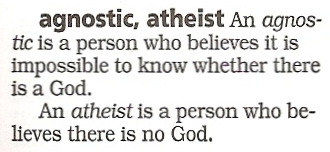I was recently flipping through the 2007 AP Stylebook, and I came to the entry for “agnostic, atheist” on page 9. The stylebook definition given for atheist is, “An atheist is a person who believes there is no God.” It is my opinion, that this is not an accurate definition. According to Merriam-Webster, theism is the “belief in the existence of a god or gods”. The prefix “a-“, meaning without, only adds that atheists are without said belief. Atheism does not make any positive assertions nor does it represent a belief. It represents a lack of belief.
While your definition reads, “An atheist is a person who believes there is no God,” I believe it would be more correctly stated as, “An atheist is a person who does not believe in the existence of God.”
Furthermore, in your definition of “agnostic” you omit the key defining element of agnosticism, i.e. an unwillingness to commit. Merriam-Webster defines “agnostic” as “a person unwilling to commit to an opinion”. While your definition states, “An agnostic is a person who believes it is impossible to know whether there is a God,” I believe it would be more complete if read as, “An agnostic is a person who is unwilling to commit to a belief of the existence or nonexistence of God.”
It should go without saying that where “God” is used in these contexts, it could and should be substituted with “a god.” Your stylebook dictates the capitalization of ‘God’ “in references to the deity of all monotheistic religions” (pg 106), but atheism and agnosticism are not exclusive to monotheistic religions.
I appreciate your time and attention to these discrepancies. I hope that you will consider corrections to these entries to prevent any potential misconceptions among your publications’ users. Please feel free to contact me with any questions or comments.
Sincerely,
My Name
My Email @ddress
http://www.merriam-webster.com/dictionary/theism
http://www.merriam-webster.com/dictionary/agnostic


